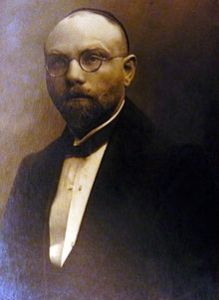TIDES ALSO COME IN
(A response to Arnold. And to Cupitt.)
A stormy sea today.
Grey rock pools catch a leaden sky
In Lowry hues; not very far away
Bangor’s a shade; the hills of Ireland peer,
Like dragons’ silhouettes through wind-whipped spray.
Come, take the salt air, walk while the wind’s high!
Only, the waves have now fled far away,
Allowing an alien landscape to appear,
Of lobsters, driftwood, boulders carried high
By the once full tide. Now spattered by the rain,
This sad detritus provokes fear
Far less than pity. Better to stroll
When waves boom feet away and thus attain
A sense of nature’s power beyond control.
Matt Arnold, long ago,
Saw high tide on the Channel, and he thought,
“A metaphor for the end of ebb and flow
Of human history!”; we
Absorbed what we for decades long were taught,
That this was common sense for all to see.
The Sea of Faith
Was once, too, at the ebb, and earth’s new dawn
Lay in the power of reasoning man’s mind.
Yet all remained enslaved to Adam’s faults.
The flotsam of bared psyches still could spawn
Fresh storms of death.
Red China, Agent Orange, Stalin’s vaults
Moistened the sand with blood of humankind.
What is truth? Well, love is true,
Though invalid to an online spreadsheet form.
How did those vain lies become the norm,
That reason, function, to a new
And better world inevitably lead?
Such certitude, nor peace, nor help for pain
Did bring; yet massive strain
Was spent to get us sailing by this creed,
And scuttle what we didn’t know we’d need.








